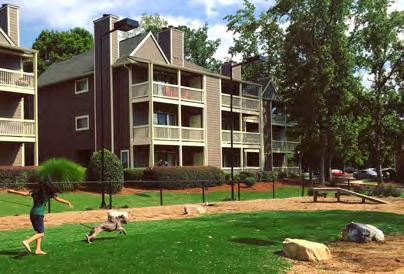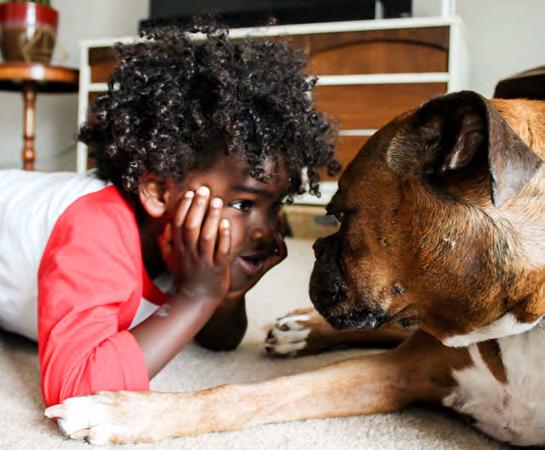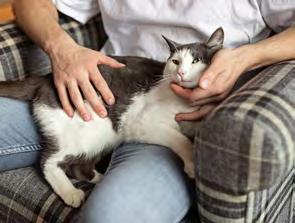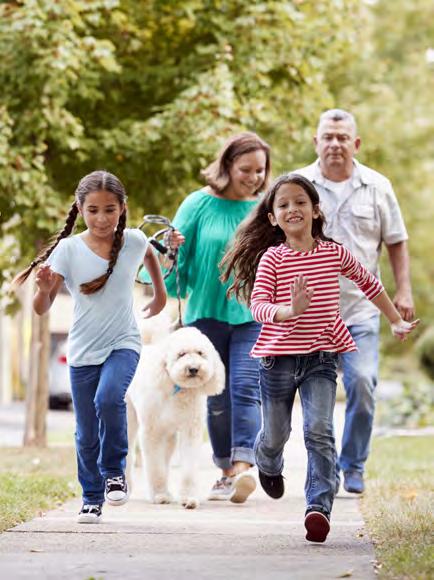
11 minute read
Executive Summary
A comprehensive survey of residents and owner/operators reaffirms the economic benefits of pet-inclusive housing

72%
The scarcity of pet-inclusive rental housing continues to be a barrier for pet owners throughout the United States. More than two-thirds of U.S. households own at least one pet. Among residents, however, 72% report that pet-friendly housing is hard to find. Despite the high volume of residents seeking homes that accept pets, many rental properties are not fully pet-inclusive, and prevent or significantly restrict residents from keeping pets in their rental properties. This scarcity is particularly acute for lower-income pet owners.
Owner/operators often cite the following reasons why they choose to restrict or even ban pets from their rental properties: ▪ The need to reasonably protect against physical property damages that are assumed to be caused by pets ▪ The perceived risk of larger animals and certain pet breeds harming people, pets, or property ▪ The desire to uphold a positive reputation of their residential communities ▪ The responsibility to sustain the health and safety of the entire rental housing community
While these are legitimate concerns, each can be addressed in such a way that pets could be included in these properties and communities. Research shows that a strong case can be made that this will benefit both residents and property owner/operators.
An overwhelming majority of Americans consider their pets to be family. The bond between humans and their pets is undeniable, and scientific evidence demonstrates that companion animals contribute to the physical, mental, and emotional well-being of their owners.
This love of pets, and their benefits for people, form the common ground upon which we can hold a productive conversation and attain pet-inclusive solutions that are beneficial for all involved.
The disconnect between supply and demand for truly pet-inclusive housing provides a great opportunity for both residents and owner/operators, all of whom believe that pets help bring people and communities together.
In 2019, Michelson Found Animals Foundation (MFA) and the Human Animal Bond Research Institute (HABRI) engaged consulting firm LRW to research and survey owner/operators and residents about pet-friendly housing—the first comprehensive survey on this subject in more than 15 years. The research had the following goals: ▪ Understand the current housing circumstances of residents with and without pets, and their attitudes and priorities for pet-friendly housing; ▪ Understand the perceptions of property owner/operators toward petfriendly housing and residents with pets; ▪ Document the policies that govern pets in rental housing; ▪ Uncover the economics surrounding pet-friendly rental housing; and ▪ Bring forward data that could contribute to a new, productive dialogue between property owner/operators, residents, and the animal welfare community.
Together, MFA and HABRI created the Pet-Inclusive Housing Initiative (PIHI) to share this groundbreaking research; to develop helpful datadriven resources; and to form partnerships that seek to increase the availability of pet-inclusive rental housing. PIHI will demonstrate the benefits of pet-inclusive housing to owner/operators, residents, and communities so that everyone can have access to the joy of healthy pets in their lives. Visit petsandhousing.org to learn more. COVID-19 and the Rental Housing Community
The COVID-19 pandemic has already had a significant impact on the rental housing community. While Americans are spending more time at home, they are also experiencing increased flexibility about where they can work and live, often moving away from the big cities to more affordable and less dense areas. These trends are likely here to stay, and many owner/operators are facing challenges to keep and attract residents. Embracing pet-inclusive policies can significantly aid owner/operators in maximizing their full level of profitability and sustainability.

Research Methodology
The market research, conducted by data and analytics consultancy LRW on behalf of Michelson Found Animals Foundation (MFA) and the Human Animal Bond Research Institute (HABRI), was administered to explore the current housing circumstances and perceptions of U.S. residents in rental housing with and without pets in non-rural settings, and the perceptions and policies of property owner/operators about pets, pet-friendly housing, and pet owners. The research was conducted online in 2019 among a nationally representative sample of 1,299 residents and by phone with 551 property owner/operators.

About the PIHI Survey
RENTAL RESIDENTS SURVEY
1,299 rental residents were surveyed, including a Los Angeles augment of 287 renters (some of whom completed the survey as part of the national sample and are counted as such). All residents currently rent their home or living space in a non-rural setting. The nationwide survey was completed by 749 pet owners and 300 non-pet owners. The Los Angeles augment included 232 pet owners and 55 non-pet owners.
OWNER/OPERATORS SURVEY
551 owner/operators were surveyed, including a Los Angeles augment of 67 participants (comparisons will be made against national data). This augment includes owner/operators who completed the survey as part of the national sample. All owner/operators surveyed were currently responsible for residential (nonvacation) property in a non-rural setting.
Data was weighted to be representative of the non-rural U.S. renter population (based on age, gender, income, and ethnicity). Household types were weighted to align with renters’ data.


Report Terminology
Defining the distinctions between pet-friendly housing and pet-inclusive housing, and more
Pets Pets provide people with love, companionship, and joy. Eighty-five million U.S. households are home to at least one pet, and 98% of pet owners consider pets to be important members of the family.1 While they do provide scientifically documented benefits to our health and wellness, pets are not afforded special access to public facilities or businesses. The benefits of pet ownership come with responsibilities, including a commitment to the care and welfare of the pet.
The human-animal bond The human-animal bond is the mutually beneficial and dynamic relationship between people and animals that is influenced by behaviors that are essential to the health and well-being of both.2 Scientific research demonstrates that the human-animal bond is associated with improvements in human health, including reduced blood pressure, decreased stress, and higher levels of physical activity.
NEW TERMINOLOGY TO BETTER DEFINE AND MEET MARKET NEEDS
Pet-friendly housing The survey identified two broad cateories of rental housing: 1) pet-friendly and 2) non-pet-friendly. Pet-friendly housing includes any housing that allows residents to have at least one pet, regardless of other restrictions. Non-pet friendly housing includes any rental housing that does not allow any pets. Throughout this report, when we are citing data from the market research, we are referring to pet-friendly housing unless stated otherwise.
Pet-inclusive housing The term “pet-inclusive” represents housing with policies that allow residents additional flexibility on the number, type, size, and breed of pets. Pet-inclusive housing is not only devoid of unnecessary restrictions on pets, it represents a welcoming environment in which pets and pet-owning households are seen as an asset to the communities where they live.

98%
Key Findings
PIHI’s market research provides a better understanding of owner/operator and resident perceptions of pet-inclusive housing
EVERYONE LOVES PETS
Pets are widely considered important members of the family and represent a basis for common ground. ▪ 98% of residents with pets and 92% of all residents surveyed consider pets to be important members of the family. ▪ 93% of property owner/operators agree pets are important members of the family.
RESIDENTS PREFER PET-OWNING NEIGHBORS
Pet owners are perceived to be nice, friendly, caring, and good people by their neighbors. In comparison to others, including neighbors with children, pet owners are preferred by both pet-owning and nonpet-owning residents.
Love of pets is common ground.

CRYSTAL MARTIN
Director of Multifamily Operations Leon Capital Group, Dallas, Texas
RELATIONSHIPS BETWEEN OWNER/OPERATORS AND PETS IS STRONG
95% of residents with pets said that their property owner/operator has a positive relationship with their pet. 86% of owner/operators believe they have a positive relationship with most tenants who have pets. 95% of residents with pets noted that their owner/operator is aware of their pet. 73% of residents said that their owner/operator has met their pet. 86% of owner/operators said they would work with their residents if they discovered they had an unapproved pet.
OWNER/OPERATORS ARE MOVING IN THE RIGHT DIRECTION
Research shows that 76% of property owner/ operators identify their properties as allowing some pets, which reflects a willingness to accommodate pets by a large majority of property owner/operators.
However, residents’ experiences and attitudes show the need for further progress.
Among residents: ▪ 72% say pet-friendly housing is hard to find. ▪ 59% say pet-friendly housing is too expensive. ▪ 24% say their pet has been a reason for needing to move. ▪ 14% have surrendered their pet as a result of their housing situation.
RESIDENTS WITH PETS STAY LONGER

On average, residents in pet-friendly housing stay 21% longer than those in non-pet-friendly housing. This translates to residents staying about 10 additional months.
83% of owner/operators say pet-friendly vacancies are filled faster. 79% of owner/operators say pet-friendly units are easier to fill.
RESTRICTIONS LIMIT PET-FRIENDLINESS
76% of property owner/operators say their properties are pet-friendly, but only 8% are free of all restrictions.
While certain restrictions are appropriate for some rental properties, such as a limitation on the total number of animals permitted, the vast majority have restrictions that could be relaxed without detriment to the community.

AN OPPORTUNITY FOR ALL
Easing restrictions on pet-friendly housing saves lives. Restrictions on pets in rental housing is suppressing the number of homes available for pets.
33% of pet-owning residents say they would get another pet if restrictions on their rental housing were lifted. 35% of residents without pets would get a pet if restrictions were lifted.
With a common-sense easing of restrictions over time, up to 8.2 million more animals could find homes in pet-inclusive rental housing. This will not only save the lives of these animals and improve the lives of their owners but also represents a revenue opportunity for property owner/operators.
Easing restrictions on pet-friendly housing makes economic sense. Pet-friendly housing offers property owner/operators more secure revenue, as residents who live in these residences are staying longer than those in non-pet-friendly housing.
The average pet deposits and fees more than cover any damages pets might cause. Pet-owning residents are paying an average of $864 in deposits (security, pet and one-time fees) as well as an average of $600 over the course of a year in monthly pet fees.
Fewer than 10% of all pets cause damages of any kind. The average dollar amount for repair of damages caused by pets is $210, and many residents choose to pay for these damages out of their own pockets rather than rely on deposits paid to property owner/operators.


How the Coronavirus Pandemic Underscores the Importance of Pets
Pets have played an important role for people during the coronavirus pandemic. Recent surveys have found that pets are helping their owners reduce feelings of depression, anxiety and loneliness, and that people have spent more time with their pets overall during the pandemic.3 In addition, millions of Americans acquired new pets during the pandemic,4 along with a significant increase in those who are fostering pets for animal shelter and rescue organizations. This infusion of new pets, and the important role they have played during the pandemic, make it even more important for owner/operators to consider how they can better accommodate residents with pets. The need to walk or run with a dog provides an important reason to get outside and maintain fitness levels as well. While social distancing may still be necessary, walking our pets remains on the list of approved activities even when stay-at-home orders are put in place. Even spending just a few minutes outdoors and seeing a happy pet can brighten spirits during difficult times.
Alleviating resident stress has been a high priority for many property owner/operators during the pandemic. Pressures continue to mount for residents.5 Among them are health concerns, the strain of working from home with children out of school or in virtual school, the cancellation of travel plans, the uncertainty of a resolution, and the need to pay rent even if they are unemployed or underemployed. By August 2020, more than 57 million Americans had filed for unemployment.6
The powerful ability that companion animals have to reduce stress can be very important to owner/operators in the current environment and going forward. While many residents have experienced the social isolation of the pandemic, and/or are encumbered with playing the role of both parent and teacher, pets are there to provide support. Now more than ever, pets should be welcomed at rental housing communities with open arms.




